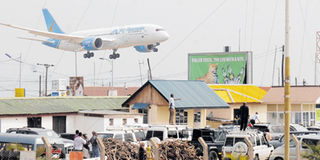Bird strikes pose major challenge to airlines

What you need to know:
Two days ago, Air Tanzania’s Bombardier 5H-TCE aircraft hit the birds during landing at Mwanza Airport. This happened three days after Precision Air reported that it had grounded its ATR-72-500 aircraft after it ran into a flock during landing
Dar/Mwanza. In less than a week, two planes have collided with birds at Mwanza Airport raising flight safety concerns and related airline cost implications, as airport authorities struggle to contain the worrying incidence of bird strike.
The cost, depending on type of aircraft, can be as high a $2 million (about Sh4.6 billion), it came to light.
Two days ago, Air Tanzania’s Bombardier 5H-TCE aircraft hit birds during landing at the Lake Zone’s major airport. This happened three days after Precision Air reported that it had grounded its ATR-72-500 aircraft for damage assessment after it run into a flock during landing at the same airport.
Both aircraft— that of ATCL and of Precision Air— however, landed safety. But such incidents are a threat to flight safety around the world and have caused a number of accidents with human casualties, according to the International Civil Aviation Organization (Icao).
Mwanza struggling
Details obtained from the Icao’s website show that the birds, usually flying over airports located close to lakes and wildlife areas, could collide with aircrafts at altitudes as high as 6,000 to 9,000 metres.
However, airport authorities in Mwanza—a region notorious for birdstrike cases in the country—are currently relying on ground-level mechanisms, such foot patrols and use of vehicles to scare away birds from the airport.
Mwanza Airport manager Maulid Mohamed told The Citizen that there was a surge in the number of birds hovering at the airport this year due to ongoing heavy rains in the region. “In this season, flocks have increased compared to previous years,’’ said Mr Mohamed.
“We have placed various people at the airport who will ensure that there is no bird that hangs around when a plane is landing,’’ he said during an interview with The Citizen.
But, as a standard, Icao requires all airport authorities to take action by decreasing the number of birds in the vicinity of airports in order to reduce the risk of bird strikes.
Damage can be huge
On Sunday December 9, Precision Air’s aircraft which was landing at Mwanza Airport was hit by several birds on the aircraft’s nose, windshield, nose landing gear, main landing gear and engines, reported Aviation Safety Network.
Precision Air’s chief executive officer Sauda Rajab said that the aircraft was then grounded for assessment by engineers. “[Birds] can damage engines…imagine when the engine is damaged and we have to pay up to two million dollars to replace it,’’ she explained.
ATCL’s aircraft, which was also hit by birds on Wednesday, has so far reported that the incident was minor. Company’s Communications officer Joseph Kagirwa said that the birds that hit the aircraft were few and did not cause significant damage.
Experts say that even though majority of reported bird strike have little or no effect on continued safe flight but flocks of large birds can damage aircraft badly.
In cases where the aircraft was taking off, it may fail to continue flying and need to do emergency landing at nearest airport, says a commercial aviation consultant based in Dar es Salaam, Mr Jimrey Nangawe. This, he said, carries huge cost implications to airline companies.
According to the International Civil Aviation Organisation, bird strike cases cost 118,000 hours per year of aircraft down time and $123 million in annual monetary damages.
A 2017 study published in the Advanced Journal of Technical and Vocational Education, titled: Bird Strike Case Study at Airport Level to Include Take Off, Landing and Taxiways has detailed how an airline can incur high costs in cases of bird strikes.
“The significant part of the total cost is associated with non-damaging bird strikes which lead to fuel damping, go-around, missed flight connections and passenger delays,” says the study conducted at several airports in the United Kingdom such as Gatwick Airport and Cardiff Airport.
More risky: takeoff or landing?
During an interview with The Citizen, aviation expert Jimrey Nangawe said that an aircraft which collides with birds during takeoff may incur high cost, depending on how heavily it was loaded and the distance it was scheduled to fly to its destination.
“Both takeoff and landing are critical moments in an incident of bird strike….during take-off it could be more challenging if the aircraft has a huge load and it was travelling far...,’’ explained Mr Nangawe. “At that moment, every second counts, so the pilot may need to burn off fuel to offload the engines…so it could be more challenging,’’ he noted.
“But pilots have been trained to deal with such scenarios and during training they do a lot of simulations,’’ explained Mr Nangawe.
Why Mwanza is notorious
Mr Nangawe said Mwanza is notorious for bird strikes because it’s close to Lake Victoria where birds prey on fish and explained why it’s not an easy task to eliminate them.
“I don’t think it’s easy to eliminate them completely, I know that there have been interventions like scaring them off before the aircraft is cleared for landing or take off,’’ said Mr Nangawe.
Jets vs propellers
Literature on aviation shows that modern commercial aircraft such as Boeing and Airbus have quieter jet engines. This can make it difficult to detect and prevent bird strikes, unlike the older aircraft with propeller engines which make more noise to scare off birds.
Current aircraft certification standards, according to various researches, include requirements to demonstrate both engine and airframe resistance to bird impact.
TAA speaks out
Tanzania Airports Authority’s (TAA) director general Richard Mayongela said the authority was now planning to adopt long-term measures to deal with the birds at Mwanza Airport.
“We want to start learning from other countries facing a similar problem…we also want to start employing technology,’’ he said in an interview.
Take a leaf from KIA
In the meantime, Precision Air’s CEO Sauda Rajab suggested that the interventions in Mwanza’s case can take a leaf from the book of some airports such as Kilimanjaro International Airport (KIA), where, among other things, one way involves shooting firearms in the air before the plane is cleared for landing.
“I know that at KIA some research was done and this led to some interventions. I do believe the same can be done for Mwanza Airport where cases of bird strikes have been reported quite often,’’ Ms Rajab noted.




